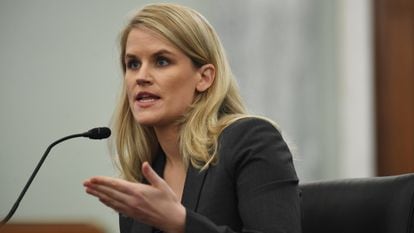Social networks are facing a colossal cliff in the US. Their business model has been singled out by a tsunami of lawsuits from individuals, educational institutions and public prosecutors. They accuse the platforms of consciously damaging the mental health of young people. And not just because of the content they help disseminate: the very design of the product, the claimants argue, seeks addiction in order to ensnare the user. The more time people spend hooked to the screen, the greater the economic benefits from advertising. This vicious circle, the lawsuits argue, is having terrible effects on children and teenagers, who suffer from depression, eating disorders or even suicidal tendencies.
A 16-year-old Utah girl becomes so obsessed with her body image after getting hooked on Instagram that she develops anorexia and bulimia. A nine-year-old Michigan boy spends so many nights watching YouTube, TikTok and Snapchat videos that he ends up uploading a nude photo of himself that goes viral. An 11-year-old Connecticut girl deals for two years with an extreme addiction to Instagram and Snapchat before spiraling into insomnia and depression that leads her to take her own life. These harrowing cases, reported last year by Bloomberg, are among hundreds of private lawsuits filed against social networks in recent months.
Two hundred of them have joined together in a class-action lawsuit. Filed in the Northern District of California in March, the lawsuit charges that Meta (for Facebook and Instagram), Snap (for Snapchat), ByteDance (the company that owns TikTok) and Google (for YouTube) are seriously harming the mental health of young Americans. The process is currently in the pleadings phase. The U.S. Supreme Court is due to decide in June whether the lawsuit goes forward or is dismissed.
This newspaper has contacted the four technology companies to inquire about their position on the process. All of them have declined to comment specifically on the lawsuit, beyond assuring that they are taking steps to strengthen content control. “We have developed more than 30 tools to support teens and their families, including features that allow parents to decide when and for how long their children can use Instagram,” notes, for example, Antigone Davis, global director of Meta Security. The company led by Mark Zuckerberg has just reached an out-of-court settlement to compensate users of Facebook whose data was leaked to Cambridge Analytica with 725 million dollars.
“Our case doesn’t just look at the content of the platforms, the issue is deeper than that. We allude to the very design of the social networks: from the age verification systems, or the lack of them, to different features of the platform itself that, we argue, were specifically designed to be addictive,” Joseph VanZandt, of the Beasley Allen firm, explains to EL PAÍS by videoconference. VanZandt leads the legal counsel coordinating the class action lawsuit, which involves two other law firms and several private lawyers.

“Everything from the way videos and posts are displayed and arranged, to the design and placement of buttons, is designed to foster addiction and keep users coming back to the platform again and again,” VanZandt argues. “In addition to the design of social networks themselves, the demand impacts how the platforms’ algorithms work. They are designed to give more traction to content that increases interactions and engagement on the platform. All with the aim of increasing advertising revenue,” he stresses. “To test this, we are working with a wide network of experts who argue how these springs work, as well as the impact they have on young people. We are confident in our ability to be able to prove that our customers are being harmed by these products.”
A tsunami of lawsuits
The first case accepted by VanZadt’s team was that of Brianna Murden, a 21-year-old who started using social networks at the age of 10. “After years of exposure to content from various platforms selected by algorithms, subjected to a torrent of notifications 24 hours a day, [the networks] have caused her depression, insomnia and eating disorders, among others.” In August last year, they filed a lawsuit against Meta and other platforms. A few weeks later, they had dozens of similar petitions. The same thing happened in other offices. The torrent of lawsuits soon became a tsunami. Hence, they decided to file a class action lawsuit.
California’s is not the only lawsuit filed against social networks over this issue. In January of this year, Seattle Public Schools sued TikTok, Facebook, Instagram, YouTube and Snapchat, pointing to them as responsible for ruining the mental health of teenagers. It was the first time a public institution took legal action against social networks. After the Seattle school institution came those of New Jersey, Florida or Pennsylvania. Similar proceedings have also been initiated by the attorneys general of Indiana or Arkansas, among others. “At this rate, it seems that social networks will face lawsuits in every state in the country,” said Jim Steyer, president of Common Sense Media, a well-known NGO that evaluates the impact of technology and media on children.
The brief from the Seattle schools, which represent more than 100 schools with some 50,000 students, argues that the algorithms of these platforms are showing young Americans potentially harmful content and causing harmful emotional impacts. It is also said that victims of social networks with “severe addiction” can be affected by “mental and physical problems.” The lawsuit claims that schools are unable to properly educate children because of social media addiction and related consequences.

“We want these companies to be held accountable for their actions and the damage they are causing. Not only to the students, but also to Seattle Public Schools, which has to bear the operational burden and increasing costs attributable to this mental health crisis,” Greg C. Narver, head of the legal department of the educational institution, tells this newspaper. Those costs include hiring psychologists, specific training for faculty, updating textbooks, and restitution of property damaged by “emotionally disturbed” students.
“We cannot give a concrete figure of how many students currently have mental problems. However, we have experienced a sharp increase in requests from schools and students for mental health-related services,” Narver adds.
The elephant in the room of social media
Several studies attest to the worsening mental health of young Americans. A recent report by the country’s national public health agency certifies that “the mental health of students continues to worsen”, and that many “feel so bad or hopeless that they cannot carry out their daily activities normally”. The class action lawsuit and those filed by educational institutions cite dozens of scientific articles that accredit the relationship between the intensive use of social networks and certain mental problems: from anxiety, depression, insomnia, eating disorders or cyberbullying to self-harm and suicide. A UK court ruled last year for the first time that social networks were behind a young woman taking her own life. The State of Utah, governed by Republican Spencer Cox, has decided to restrict the use of social networks among minors, who will need parental consent to use them and will not have them active from 10.30 pm to 6.30 am.
For years, the effect of platforms on mental health was ignored. It was an elephant in the room that is suddenly out in the open. This was helped by Frances Haugen, the former Facebook employee who leaked hundreds of official documents to The Wall Street Journal and fueled one of the biggest journalistic investigations in recent times, published throughout September 2021. The papers showed that the tech executives were aware that Facebook and Instagram algorithms were spreading among teenagers, especially girls, the goodness of anorexia or even suicidal thoughts. According to the technology company’s own research, 6% of American teenagers and 13% of British teenagers who said they had considered suicide were prompted to do so by Instagram.
“We expect our case to be justified, in no small part, by the defendants’ own documents and by the testimony of employees and former employees of the platforms,” Narver acknowledges, alluding to Haugen’s papers. “She was the trigger. Her revelations helped us understand how big the problem really is. Many families then understood what was happening to their children,” stresses VanZandt.
For the U.S. lawyer, the wave of lawsuits against social networks resembles the lawsuits suffered by tobacco companies in the 1990s. “The analogy is appropriate because of their procedural similarities, but also because the documents revealed by Haugen suggest that Facebook executives knew the extent to which their products could be harmful”.
A complex process
Will the lawsuits filed against the big networks prosper? “I don’t know if it has any legal standing, but what I do know is that it is a wake-up call. Until now, the design of social networks was left entirely in the hands of private companies. Now we see that they can have consequences on mental health and, therefore, we have to correct the course,” says Sergio Juan-Creix, a lawyer and expert in digital law and professor at the UOC.
One of the keys to the case will be to see if the Supreme Court considers that the platforms can avail themselves of section 230 of the Communications Decency Act of 1996, which exempts technology companies, with few exceptions, from liability for content published on them by third parties. “The plaintiff will have to prove that there is a link between the features of the platform, the activities they enable and the harm to the mental health of young people. I don’t think it will be easy to prove,” considers Rodrigo Cetina, professor of law at the Barcelona School of Management, the business school of the Universitat Pompeu Fabra.
To date, the courts have stopped several lawsuits against social networks when they relied on Section 230. One case, Gonzalez V. Google, is due to be resolved in June or July, which will test the Supreme Court’s interpretation of this article. The suit was brought by the family of an American woman killed in the Bataclan attack in Paris. The plaintiffs allege that exposure to YouTube radicalized the terrorists, ultimately redounding in the attack that led to the young woman’s death.
“The Gonzalez V. Google ruling will be important in our process, but not definitive, because we go beyond content: we argue that, like slot machines, social networks are designed to be addictive. And that this entails a series of harms of which their creators are aware,” says VanZandt.
Sign up for our weekly newsletter to get more English-language news coverage from EL PAÍS USA Edition





